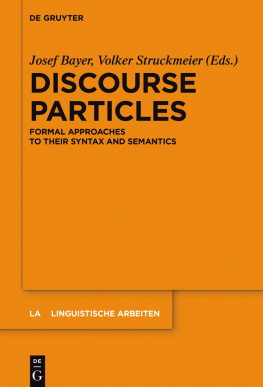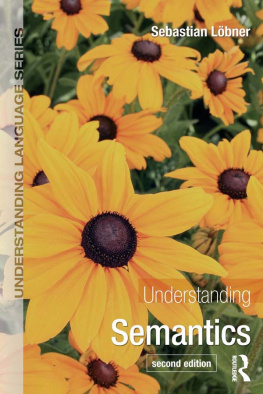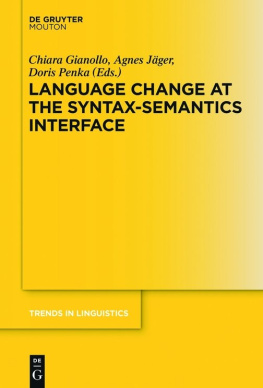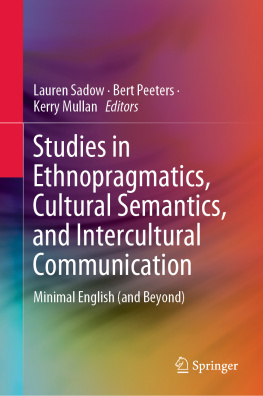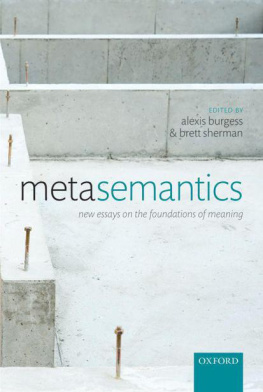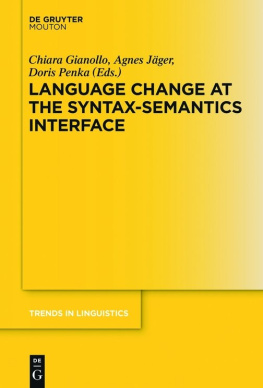
Borg, Emma , Department of PhilosophyUniversity of Reading
Minimal Semantics
Print ISBN 0199270252, 2004
doi:10.1093/0199270252.001.0001
Abstract: Seeks to defend a formal (e.g. truth-conditional) approach to semantic theorizing from advocates of so-called 'dual pragmatics' (e.g. relevance theorists or contextualists). I argue, first, that formal semantics is preferable to pragmatically saturated approaches since only formal accounts are compatible with a modularity view of linguistic understanding (a view which is itself, I suggest, independently well motivated). Secondly, I contend that the arguments currently on the table in favour of dual pragmatics fail to show that formal semantics should be abandoned. These arguments for dual pragmatics stem from the existence of overt context-sensitivity in natural languages (for instance, in the form of indexicals and demonstratives) and the purported existence of covert context-sensitivity (in the form of 'unarticulated constituents'). I look at these arguments in detail and suggest how the formal theorist can accommodate the apparent intrusion of pragmatics into the semantic realm. My defence of formal semantics holds, however, only given an appreciation of what I deem to be the limits of semantic theorizing. Thus, I argue overall for a minimal conception of the nature of semantic theories.
Keywords: context-sensitivity,contextualism,demonstratives,formal semantics,modularity,pragmatics,relevance theory,truth-conditions,unarticulated constituents
Minimal Semantics
end p.ii
Minimal Semantics
CLARENDON PRESS OXFORD
end p.iii

Great Clarendon Street, Oxford ox 2 6 dp
Oxford University Press is a department of the University of Oxford.
It furthers the University's objective of excellence in research, scholarship,
and education by publishing worldwide in
Oxford New York
Auckland Bangkok Buenos Aires Cape Town Chennai
Dar es Salaam Delhi Hong Kong Istanbul Karachi Kolkata
Kuala Lumpur Madrid Melbourne Mexico City Mumbai Nairobi
So Paulo Shanghai Taipei Tokyo Toronto
Oxford is a registered trade mark of Oxford University Press
in the UK and in certain other countries
Published in the United States
by Oxford University Press Inc., New York
Emma Borg 2004
The moral rights of the author have been asserted
Database right Oxford University Press (maker)
First published 2004
All rights reserved. No part of this publication may be reproduced,
stored in a retrieval system, or transmitted, in any form or by any means,
without the prior permission in writing of Oxford University Press,
or as expressly permitted by law, or under terms agreed with the appropriate
reprographics rights organization. Enquiries concerning reproduction
outside the scope of the above should be sent to the Rights Department,
Oxford University Press, at the address above
You must not circulate this book in any other binding or cover
and you must impose this same condition on any acquirer
British Library Cataloguing in Publication Data
Data available
Library of Congress Cataloging in Publication Data
Data available
ISBN 0-19-927025-2
1 3 5 7 9 10 8 6 4 2
end p.iv
end p.vi
Preface and Acknowledgements
Certain sections of this book are marked with a star (*). This indicates that the section contains introductory material which may be skipped by readers already familiar with the topics to be discussed. The reasons for including this kind of material are three-fold: first, I hope the book may be of some interest to readers outside philosophy (for example, those working in cognate disciplines, like linguistics or cognitive science), not all of whom will be familiar with the core philosophical notions and terminology in play. Secondly, philosophy of language has an (often deserved) reputation for being an exceptionally hard subject. However, although this is a research book, I don't think the subject matter is beyond the understanding of an interested (and perhaps relatively advanced) undergraduate. So I wanted to make the book as accessible as possible to those just starting out on their own exploration of the nature of language. Finally, abstract philosophical discussions can sometimes seem a bit like card tricksyou can see that the conjuror has located the card he was supposed to, but you've really no idea how he did it. By 'showing the working' I hope to make it clear that I didn't have anything up my sleeves to begin with; but readers who are happy to take this on trust are well advised to ignore '*' sections.
Many people deserve thanks here and I'm afraid the following list is far from exhaustive. To start at the beginning, however, although this book isn't my PhD thesis (nor is it anything like my PhD thesis), still the people who helped with that project deserve thanks herethat includes Marcus Giaquinto, Paul Horwich, Matthew Nudds, Gabe Segal, Matthew Soteriou, and especially Mike Martin. I'm greatly indebted to all my colleagues at Reading, especially those who came to the reading group I ran on this material. The many suggestions and objections made by colleagues and graduate students in those meetings have much improved the book. Thanks also to Jean Britland and Sarah Nolan, without whose outstanding secretarial support this research would never have been possible. Many people have made extremely helpful comments on bits of the book, either in the form of earlier papers or at conferences. These include Kent Bach, Alex Barber, Jonathan Berg,
end p.vii
Jessica Brown, Robyn Carston, Eros Corrazza, Ray Elugardo, Maite Ezcourdia, Sandy Goldberg, Peter Ludlow, Franois Recanati, Jennifer Saul, Jason Stanley, and Ken Taylor. Attendance at certain of these conferences was made possible by the University of Reading Research Travel Fund and the British Academy. Special thanks must go to Stefano Predelli and Rob Stainton, both of whom commented at length on the manuscript and whose comments have much improved the bookif I could have found answers to all their objections, it would have been even better. My greatest philosophical debt is to Ernie Lepore, and all aspects of this book owe a debt to discussions with him. Peter Momtchiloff at Oxford University Press has been an exemplary editor and I'm grateful to him, Susan Beer, and the rest of the team at Oxford. Finally, on a personal front, I'd like to thank Jim for pretty much everything, and my Mum, for, among so many other things, recognizing the educational value of programmes for schools.
Chapter , Kluwer Academic Press. I wish to thank the editors and publishers concerned for permission to use this material. This research was funded in part by the Arts and Humanities Research Board and by the Mind Association.
E. G. N. B
end p.viii
Contents
Introduction |
| A Tale of Two Theories 1.1 | Formal Semantics | 1.2 | The Challenge from Context | 1.3 | Dual Pragmatics | 1.4 | The Dispute between Formal Semantics and Dual Pragmatics | 1.5 | Logical Form |
|



